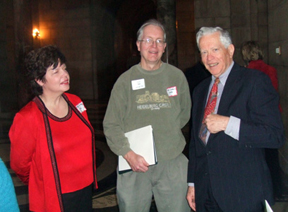 |
Monnie Lindsay, left, and Keith Knudsen talk with Sen. Lowen Kruse about LB 700. |
On Wednesday, the 13-year-old told Judiciary Committee members she hopes for a cure so she can “live without fear.”
Berens was among the youngest to testify in opposition to LB 700, a bill that purports to ban the cloning of humans, also known as “reproductive cloning.”
The bill, however, also would ban a technique known as somatic cell nuclear transfer (SCNT) or “therapeutic cloning,” which allows scientists to study the basis of human disease and develop future therapies and cures.
That process provides hope to Berens and the dozens of others who traveled to the State Capitol Wednesday to oppose the bill. “The difference between you and me,” Berens told lawmakers, “is I have to poke my fingers 8 to 10 times a day and I wear an insulin pump on my body 24/7 to stay alive and you don’t.”
The crux of the testimony focused on SCNT, a promising new area of biomedical research that scientists say could result in life-saving new therapies and possible cures for such debilitating diseases as Parkinson’s disease, multiple sclerosis and diabetes.
During the nearly three hours of testimony, seven people testified against LB 700 including Ron Withem, associate vice president for University Affairs and director of Governmental Relations for the University of Nebraska system.
Withem called LB 700 “unnecessary legislation” because the University of Nebraska Board of Regents already prohibit such research. The university, he said, also is concerned that LB 700, if passed, would have a negative impact on the state’s research climate.
Under the bill, LB 700 would criminalize both reproductive cloning and SCNT, classifying them as a felony and imposing harsh penalties.
Supporters of the bill said the science “demeans life” because it destroys an embryo.
“SCNT is a technology to generate another population of cells,” said James Turpen, Ph.D., professor and vice chairman for education in the UNMC Department of Genetics, Cell Biology and Anatomy. “SCNT is not creating a new human life, it is not producing a new human embryo and it is scientifically inaccurate to assert that it is.”
Nobel laureate Harold Varmus, former director of the National Institutes of Health, has compared the impact of this research to that of splitting the atom and mapping the human genome, Dr. Turpen said.
Monnie Lindsay, J.D., said SCNT is a “promising avenue of research,” which allows scientists to recreate Parkinson’s in a Petri dish and study its origins. Lindsay was 38-years-old when she was diagnosed with the debilitating disease. Today she is the Nebraska State coordinator for the Parkinson’s Action Network.
“Hope is a hard thing to come by when you or a loved one has a chronic degenerative disease for which there is no cure,” Lindsay said. “SCNT offers a promising avenue of research for us which gives us that hope.”
According to a study done by the National Parkinson’s Foundation, Lindsay said, Nebraska is the fifth highest state in the country for Parkinsons’ disease, behind North and South Dakota, Iowa and Minnesota.
The Rev. Dwight Williams, pastor of Peace Presbyterian Church in Elkhorn, supports SCNT, which he deems life affirming. “As a person of faith, I feel it is a mistake to automatically criminalize important research — including therapeutic cloning — the goal of which is to produce cells that can help us study the biology of diseases.”
Sen. Ernie Chambers of Omaha said he had concerns with the language of the bill and the possibility for “malicious prosecution.” Sen. Brad Ashford of Omaha, chairman of the Judiciary Committee, asked the bill’s sponsor, Mark Christensen of Imperial, why such a law is necessary when the university already prohibits such research. “It is hard for me to understand where the immediate harm is?” he said.
Sandy Goodman, volunteer executive director for Nebraskans for Research, said SCNT research would go on across the country, regardless of the outcome of LB 700. “When tomorrow is today will you stand here to vote to deny (Nebraskans) the benefits of this research?”
Click here to see blog entries regarding the hearings and click here to go to UNMC’s stem cell Web site.